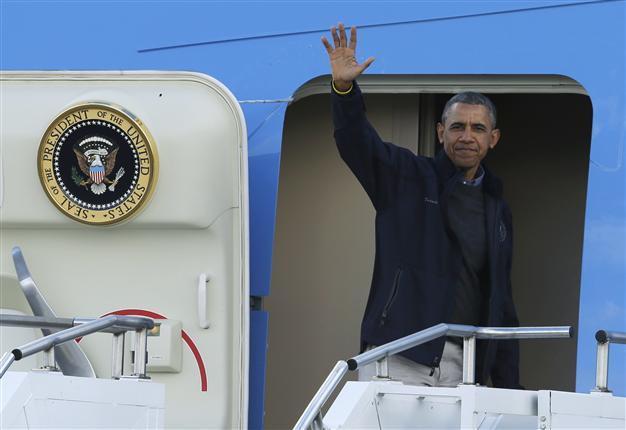Obama says disputed islands within scope of US-Japan security treaty
TOKYO - Agence France-Presse

President Barack Obama waves from the doorway of Air Force One as he leaves for Tokyo, Tuesday, April 22, 2014. AP Photo
U.S. President Barack Obama has assured Japan that tiny islands in the East China Sea at the heart of a territorial row with China are covered by a bilateral security treaty that obligates America to come to Japan's defence.
Obama gave the assurance in remarks published by the Yomiuri newspaper on Wednesday, hours before he was due to arrive in Tokyo for a visit aimed at reaffirming strong U.S.-Japan ties in the face of rising tensions over China and North Korea.
"The policy of the United States is clear - the Senkaku islands are administered by Japan and therefore fall within the scope of ... the U.S.-Japan Treaty of Mutual Cooperation and Security," Obama said, referring to the disputed islands known as the Senkaku in Japan and the Diaoyu in China.
"And we oppose any unilateral attempts to undermine Japan's administration of these islands," he said.
Obama's visit to Japan is the first stop on a four-nation Asia tour. He will seek to assure key allies such as Japan and South Korea that their alliance is as strong as ever, while trying not to damage ties with an increasingly powerful China.
In written replies to questions from the Yomiuri, Obama said he had told Chinese President Xi Jinping that all nations had an interest in the peaceful resolution of East China Sea disputes.
Japanese and Chinese naval vessels and coastguard ships have played cat and mouse around the disputed islets since Japan's government purchased the formerly privately owned territory in 2012.
Japanese fighter jets scrambled against Chinese planes a record 415 times in the year through to March, up 36 percent from the previous year, Japan's Defense Ministry said recently.
Obama said any disputes should be resolved through dialogue and diplomacy, not intimidation and coercion, and also commended Prime Minister Shinzo Abe's efforts to strengthen Japan's military and deepen coordination with U.S. forces.
In a sign of the delicate balancing act that Washington now faces in Asia, he said he believes the United States and China can work together on issues of mutual interest, such as a strong global economy and the denuclearization of North Korea.
"In other words, we welcome the continuing rise of a China that is stable, prosperous and peaceful and plays a responsible role in global affairs," he said.
"And our engagement with China does not and will not come at the expense of Japan or any other ally."
Obama reaffirmed Washington's commitment to the security of Japan and South Korea, and said it would stand firm in its insistence that a nuclear North Korea was unacceptable.
"The burden is on Pyongyang to take concrete steps to abide by its commitments and obligations, and the United States, Japan and South Korea are united in our goal - the complete denuclearization of the Korean peninsula," he said.
